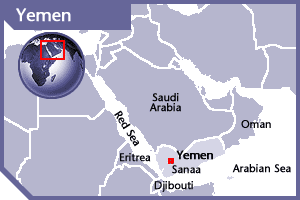Al-Qaeda blamed for attack on US embassy in Yemen
 Sana'a, Yemen - A suspected al-Qaeda attack on the US embassy in Yemen on Wednesday left 16 people dead, including six policeman and six of the terrorists, authorities said.
Sana'a, Yemen - A suspected al-Qaeda attack on the US embassy in Yemen on Wednesday left 16 people dead, including six policeman and six of the terrorists, authorities said.
The al-Qaeda militants attacked the embassy compound in the capital Sana'a using two car bombs, automatic weapons and one was wearing an explosive belt, Yemeni authorities said. The attackers were unable to penetrate the embassy wall.
A local security guard and three bystanders, including an Indian woman, were also killed, Yemeni authorities said.
"Security guards managed to explode the two vehicles away from the embassy building," Yemen's Interior Ministry said in a statement published by the official Saba news agency.
The ministry condemned the bombing as a "disgraceful act of terrorism," saying "security authorities would save no effort to pursue those behind it and bring them to justice."
The embassy itself said the attack took place at around 9:15 am (0615 GMT), with "a number of explosions" occurring in the vicinity of the main gate, and "several secondary explosions."
US State Department spokesman Sean McCormack said the first car bomb struck at the main gate and a second at a pedestrian entry while armed men unsuccessfully tried to breach the embassy grounds to further "inflict loss of life."
"The embassy security upgrades that we have been putting in place over the past seven, eight years were during this attack effective in stopping the attack, along with the response of the Yemeni forces, as well as the response of our American embassy personnel," McCormack said.
President George W Bush said the attack on the US embassy in serves as a reminder that "we are at war with extremists" and offered condolences to the families of those killed.
"This attack is a reminder that we are at war with extremists who will murder innocent people to achieve their ideological objectives," Bush said at the White House.
The embassy in a statement said the United States will work with the Yemeni government to investigate the attack and "bring the perpetrators of this heinous terrorist crime to justice."
Witnesses told Deutsche Presse-Agentur dpa a car carrying armed men in police uniforms fired a rocket-propelled grenade and drove into a road block about 100 metres outside the embassy compound.
It was followed by another car loaded with explosives, which exploded near the main gate of the compound, sending smoke billowing over the area. Residents said heavy gunfire followed the two blasts.
The men in the first car then clashed with security forces guarding the fortified compound that also hosts the ambassador's residence.
At least 13 people, mostly women and children in houses close the embassy, were injured and taken to two hospitals, they said. Three policemen were also injured.
McCormack said all US personnel had been accounted for and were safe. He said the embassy will remain closed for the immediate future and there was no date set to reopen.
Officials blamed the terrorist network al-Qaeda for the attack. "This attack carries the hallmarks and style of an al-Qaeda operation," a senior government official told dpa. McCormack also said the nature of the attack shows it was likely an al-Qaeda operation.
Police officers at the scene said no embassy staff were hurt in the attack. Security forces cordoned off the area and prevented journalists from reaching the scene.
This was the most deadly attack against the US interests in Yemen since the October 2000 bombing of the warship USS Cole in the southern Yemen port of Aden that left
17 sailors dead and 32 injured.
It follows a mortar attack against the US embassy in Sana'a on March 18 in which three police officers and four girls in a neighbouring school were injured.
On April 6, a similar attack targeted a residential compound housing US and Western citizens. No one was hurt in the attack.
Al-Qaeda claimed responsibility for both attacks.
After the September 11, 2001 attacks on US cities, Yemen allied itself with the US-led "war on terror" and pursued suspected members of al-Qaeda, putting scores of them on trial.
McCormack said Secretary of State Condoleezza Rice spoke with Yemeni President Ali Abdullah Saleh to underscore the importance of his country's participation in counterterrorism.
"The threat from violent extremists is also one potentially that could be directed at the Yemeni government," McCormack said. "So they fully comprehend the seriousness of the issue." (dpa)